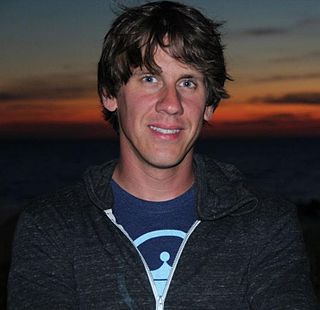A Quote by Jeremy Rifkin
Now in Wikipedia it's really interesting. If you put something incorrect up on Wikipedia within minutes there are people crawling all over that sentence saying, "This is wrong" or "I want to change this" or "You've got to include an amplification," et cetera. So there's this massive checks and balances that actually makes that accuracy work. This is the kind of model that we - and I'm not sure why no one's discussing this - that we now have to begin to apply to fake news.
Quote Topics
Accuracy
Actually
Amplification
Apply
Balances
Begin
Change
Checks
Checks And Balances
Crawling
Discussing
Fake
Fake News
Got
Include
Incorrect
Interesting
Kind
Makes
Massive
Minutes
Model
Model T
News
Not Sure
Now
Over
People
Put
Really
Really Interesting
Saying
Sentence
Something
Sure
Up
Want
Why
Wikipedia
Within
Work
Wrong
Related Quotes
I don't really agree that most academics frown when they hear Wikipedia. Most academics I find quite passionate about the concept of Wikipedia and like it quite a bit. The number of academics who really really don't like Wikipedia is really quite small and we find that they get reported on in the media far out of proportion to the amount they actually exist.
The core community is passionate about quality and getting it right. If you want to read some good criticisms of Wikipedia, probably the best place to go is to the Wikipedia article called 'criticisms of Wikipedia'... It was either the dumbest thing or the smartest thing I ever did. The dumbest thing for the obvious reasons, but the smartest thing because I don't think it could have had nearly as much impact as it has. One of the key things that inspired people to put a lot into it (was the charity aspect).
I think, ultimately, the problem with something like this is that you actually have so many more opportunities to say something than you actually have things worth saying. And then, as an artist who doesn't want to do bad work, gosh, how do you fill up all that space when you really don't have anything actually worthwhile to say? And that's what makes the job tough, because the fans get mad - "That's not funny," or "You've been sucking for several months now." And you go, "It's not my fault! I'm trying."
I'm on it pretty much all the time. I edit Wikipedia every day, I'm on Facebook, I'm on Twitter, I'm reading the news. During one of the US elections, I actually went through my computer and I blocked myself from looking at the major newspaper sites and Google News because I wasn't getting any work done.
Wikipedia took the idea of peer review and applied it to volunteers on a global scale, becoming the most important English reference work in less than 10 years. Yet the cumulative time devoted to creating Wikipedia, something like 100 million hours of human thought, is expended by Americans every weekend, just watching ads.
Early on, America took one path and went down the advertising road, and in the UK they founded the BBC and developed a different kind of public broadcasting. There was a point where TV was so beholden to commercial interest that people - civil society - actually rose up and said, "This is ridiculous: we have our soap-selling soap operas, cigarette-sponsored news broadcast; we have our rigged quiz shows - let's put some checks and balances here."


































